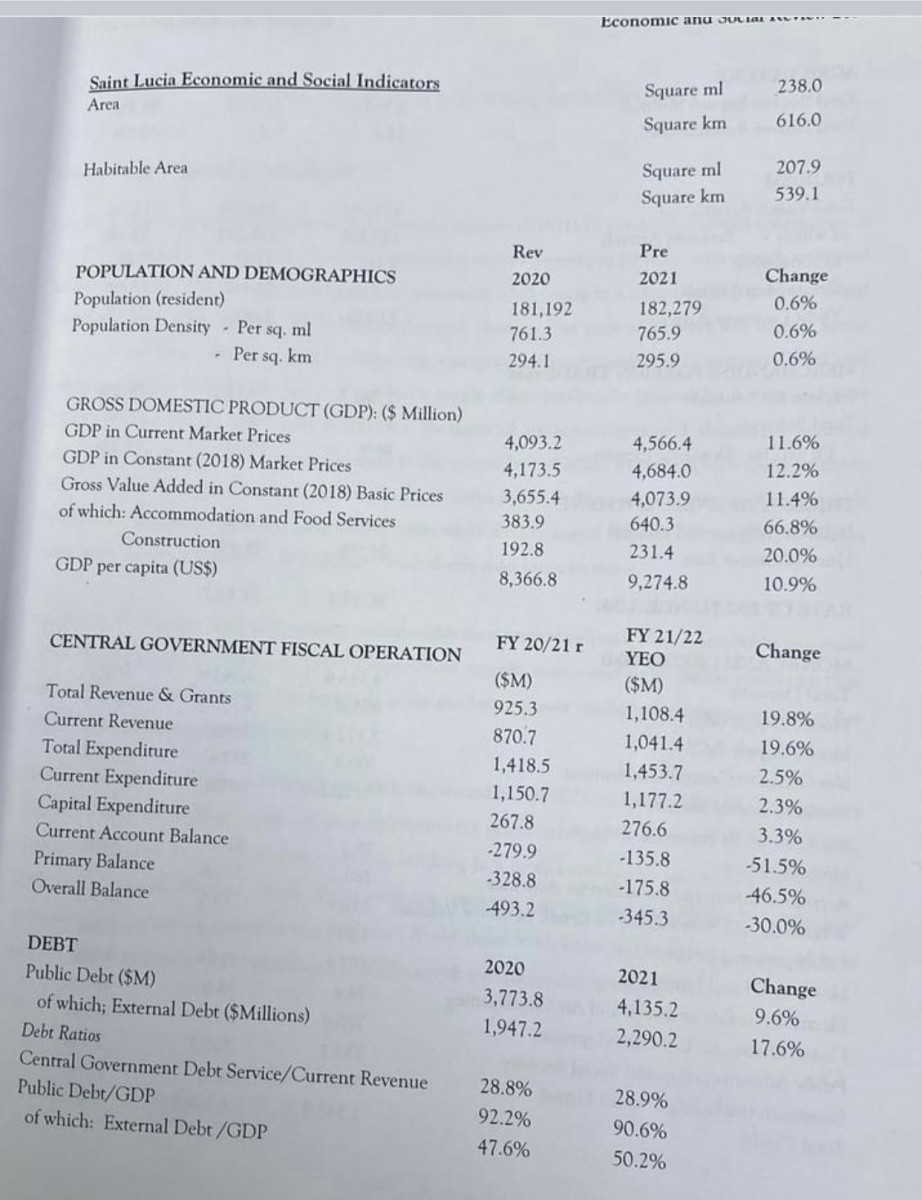By Caribbean News Global ![]()
TORONTO, Canada, (CNG Business) – Specific to the domestic environment and “preliminary estimates suggest(ing) that real GDP growth increased by 12.2 percent in 2021, rebounding from the sharp contraction of 24.4 percent in 2020,” prime minister and minister for finance, economic development and the youth economy, delivering his maiden budget policy address, “Empowering our People – Transforming our Economy” in parliament Tuesday, April 26, also advised that “ it should be noted that despite this high growth rate, the value of real GDP in 2021 was still 15 percent below that of 2019.”
With over 15,000 young people unemployed, the prime minister further indicated that the COVID-19 pandemic has highlighted the need to address the issue of productivity if we are to remain competitive.
“In this budget” the finance minister advised that “we recognize that to become globally competitive we need to address the following areas: (1) speeding up the process of technological transformation, (2) strengthening entrepreneurial capacities, (3) continuing promotion of innovation, and (4) strengthening our human capital through skills training.”
The challenges
In the budget policy address, the prime minister illustrated that:
“ In our assessment of the socio-economic landscape of our country we have identified seven major challenges confronting Saint Lucia as a small, open, and vulnerable island state with minimal natural resources:
(1) achieving sustainable high levels of economic growth that support economic transformation and poverty reduction, (2) securing fiscal and debt sustainability, (3) building resilience and adaptation to climate change, (4) reducing high levels of unemployment, especially among the youth, (5) enhancing citizen security, (6) creating a culture of good governance and intolerance towards corruption and (7) creating the global citizen.”
Poor financial – (July 26, 2021) ‘which we found, upon coming to office’
“Under the previous administration, COVID-related borrowings from regional and international creditors amounted to $323 million, and as of July 31, 2021, $301 million had been drawn down, leaving $19 million available for future use.
- For the financial year April 2020 – March 2021, the economy contracted by 24.4 percent, the largest decline in the Eastern Caribbean Monetary Union and the 6th in the world.
- At $3.9 billion, we now have the largest public debt in the Monetary Union, with debt service accounting for 31 percent of government revenue.
- Payments due to local suppliers stood at $154 million.
- Design/Finance Contracts stood at $184.5 million. These contracts were untendered contracts for road building, which are repayable within 5 years.
- Unpaid land acquisitions of $60 million.
- Monies owed to the University of the West Indies of $27 million.
- CDP Debt of $4.18 million and growing.
Infrastructure 2030
Considering the stay-over arrivals increased by 52.4 percent in 2021 after falling by 69.1 percent in 2020, representing just under half of 2019 levels and Citizenship by Investment Programme (CIP) receipts were $102.8 million compared to $70 million for the year 2020/2021, and from “initial estimates, we expect an increase in receipts for the financial year 2022/2023 over the year 2021/2022,” said the finance minister.
“The development and upgrading of Saint Lucia’s infrastructure in roads, air and seaports, water supply, sanitation, energy generation, and telecommunications are critical to raising productivity and living standards,” noting that “ In the Medium Term Development Strategy (MTDS), infrastructure has been identified as one of the economic pillars for the acceleration of economic growth.”
On March 29, prime minister and minister for finance, economic development, and the youth economy, Pierre presented a $1.842B budget “the largest budget in Saint Lucia’s history” styled “the peoples budget”.
According to the budget address, the 2022/23 budget will be financed as follows:
Recurrent Revenue of $1.150 billion comprising:
- Tax Revenue of $1.016 billion (88.4% of recurrent revenue) and
- Non Tax Revenue of $133.886 million (11.6% of revenue)
Capital Revenue from the proceeds of the sale of assets amounting to $10.686 million
Grants amounting to $176.681 million from friendly governments and multilateral institutions including:
- Republic of China on Taiwan (ROCT) – $52.623 million
- Japanese International Cooperation Agency (JICA) – $10.545 million
- UK-CIF Partnership fund – $53.145 million
- European Development Fund (EDF) – $16.592 million
- UN Environmental Programme (UNEP) – $10.694 million
- Caribbean Development Bank (CDB) – $7.718 million
- United Arab Emirates – CREF – $6.183 million
- Foreign and Commonwealth Development Office – $5.989 million
- Japanese Government – $2.989 million
- International Labour Organisation – $2.353 million
- World Bank (IDA) – $2.056
- CARICOM Development Fund (CDF) – $1.061 million
- Other donors – $4.733 million
The $1.327 billion in revenues and grants, the net financing needs of the budget amounting to $505.124 million will be met from the following sources:
Government instruments, including bonds and treasury bills of $79.736 million represent a reduction of 66.9 percent or approximately $161.128 million compared to the approved estimates for 2021/22.
Disbursements from loans totaling $425.387 million comprising:
- $57.252 million from the Caribbean Development Bank
- $3.063 million from the Caribbean Development Fund (CDF)
- $75.438 million from the International Development Agency (IDA)
- $191.824 million from the Republic of China on Taiwan (ROCT)
- $6.824 million from the IDA (Strategic Climate Fund)
- $81.0 million from the World Bank (Development Policy Credit)
- $8.590 million from CDB – Inter-American Development Bank
- $1.398 million from Canadian Clean Energy and Forest Climate Facility Fund.
Observing the budget summary of 2021 – 2022 and 2022 – 2023 it is necessary to note Saint Lucia’s budget projection vs. reality, and as specified – the 2022/23 estimates aim at:
- Providing the platform for sustained growth;
- Supporting the continued robust performance of our tourism industry;
- The expansion of construction in the public and private sector;
- Encouraging prudent, responsible, and transparent fiscal management;
- Implementing tools that will assist in significantly reducing waste and unnecessary spending;
- Developing institutional frameworks designed to eliminate corruption, and
- An environment where there is a substantial reduction in revenue from fuel.

Debt management
Meanwhile, Saint Lucia’s pregnancy is in labour hands awaiting delivery, many are not amused that “available estimates show that the overall unemployment rate was 21.9 percent in 2021, while the youth unemployment rate stood at 37.0 percent”.
“Debt is an inescapable reality if we are to finance the capital investments necessary to expand the economy. While Covid provided access to concessionary loans, the current disruption in the global economic environment brought about by the Ukraine war will result in higher interest rates making borrowing more expensive,” said the finance minister, the current level of public debt now stands at 90.6 percent of GDP of $4.13 billion. The debt stock includes central government debt, government-guaranteed debt, and public sector debt.”
Conclusion
Accessing the squabble over “GDP growth increased by 12.2 percent in 2021 following a contraction by 24.4 percent” and subsequent conversation said an economist “ exposes the ignorance of politicians and their acolytes” to understand that the “country is experiencing a correction.”
In reality, “Saint Lucia is still underperforming and has not made corrective baselines measures, social and economic foundations to pivot sustainable. However, the politics of indifference has taken root.”







